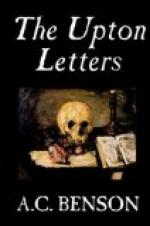Only one thought, and that a stern one, can help us—and that is the certainty that we are in stronger hands than our own. The sense of free-will, the consciousness of the possibility of effort, blinds us to this; we tend to mistake the ebullience of temperament for the deliberate choice of the will. Yet have we any choice at all? Science says no; while the mind, with no less instinctive certainty, cries out that we have a choice. Yet take some sharp crisis of life—say an overwhelming temptation. If we resist it, what is it but a resultant of many forces? Experience of past failures and past resolves combine with trivial and momentary motives to make us choose to resist. If we fail and yield, the motive is not strong enough. Yet we have the sense that we might have done differently: we blame ourselves, and not the past which made us ourselves.
But with death it is different. Here, if ever, falls the fiat of the Mind that bade us be. And thus the only way in which we can approach it is to put ourselves in dependence upon that Spirit. And the only course we can follow is this: not by endeavouring to anticipate in thought the moment of our end—that, perhaps, only adds to its terrors when it comes—but by resolutely and tenderly, day after day, learning to commend ourselves to the hand of God; to make what efforts we can; to do our best; to decide as simply and sincerely as possible what our path should be, and then to leave the issue humbly and quietly with God.
I do this, a little; it brings with it a wonderful tranquillity and peace. And the strange thing is that one does not do it oftener, when one has so often experienced its healing and strengthening power.
To live then thus; not to cherish far-off designs, or to plan life too eagerly; but to do what is given us to do as carefully as we can; to follow intuitions; to take gratefully the joys of life; to take its pains hopefully, always turning our hearts to the great and merciful Heart above us, which a thousand times over turns out to be more tender and pitiful than we had dared to hope. How far I am from this faith. And yet I see clearly that it is the only power that can sustain. For in such a moment of insight even the thought of the empty chair, the closed books, the disused pen, the sorrowing hearts, and the flower-strewn mound fail to blur the clear mirror of the mind.




